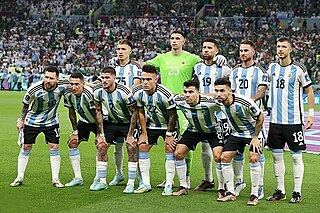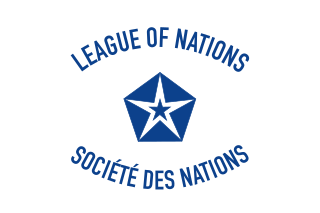
The FIFA World Cup, often simply called the World Cup, is an international association football competition among the senior men's national teams of the members of the Fédération Internationale de Football Association (FIFA), the sport's global governing body. The tournament has been held every four years since the inaugural tournament in 1930, with the exception of 1942 and 1946 due to the Second World War. The reigning champions are Argentina, who won their third title at the 2022 tournament.

The League of Nations was the first worldwide intergovernmental organisation whose principal mission was to maintain world peace. It was founded on 10 January 1920 by the Paris Peace Conference that ended the First World War. The main organization ceased operations on 18 April 1946 when many of its components were relocated into the new United Nations. As the template for modern global governance, the League profoundly shaped the modern world.

Malcolm X was an African-American revolutionary, Muslim minister and human rights activist who was a prominent figure during the civil rights movement. A spokesman for the Nation of Islam (NOI) until 1964, he was a vocal advocate for Black empowerment and the promotion of Islam within the African-American community. A posthumous autobiography, on which he collaborated with Alex Haley, was published in 1965.

A nation-state is a political unit where the state, a centralized political organization ruling over a population within a territory, and the nation, a community based on a common identity, are congruent. It is a more precise concept than "country", since a country does not need to have a predominant national or ethnic group.
The Nation of Islam (NOI) is a religious and political organization founded in the United States by Wallace Fard Muhammad in 1930. A black nationalist organization, the NOI focuses its attention on the African diaspora, especially on African Americans. While describing itself as Islamic, its religious tenets, though using Islamic terms, differ considerably from mainstream Islamic traditions. Scholars of religion characterize it as a new religious movement. It operates as a centralized and hierarchical organization.
Nationalism is an idea and movement that holds that the nation should be congruent with the state. As a movement, it presupposes the existence and tends to promote the interests of a particular nation, especially with the aim of gaining and maintaining its sovereignty (self-governance) over its perceived homeland to create a nation-state. It holds that each nation should govern itself, free from outside interference (self-determination), that a nation is a natural and ideal basis for a polity, and that the nation is the only rightful source of political power. It further aims to build and maintain a single national identity, based on a combination of shared social characteristics such as culture, ethnicity, geographic location, language, politics, religion, traditions and belief in a shared singular history, and to promote national unity or solidarity. Nationalism, therefore, seeks to preserve and foster a nation's traditional culture. There are various definitions of a "nation", which leads to different types of nationalism. The two main divergent forms identified by scholars are ethnic nationalism and civic nationalism.

The United Nations (UN) is a diplomatic and political international organization whose stated purposes are to maintain international peace and security, develop friendly relations among nations, achieve international cooperation, and serve as a centre for harmonizing the actions of nations. It is the world's largest international organization. The UN is headquartered in New York City, in international territory with certain privileges extraterritorial to the United States, and the UN has other offices in Geneva, Nairobi, Vienna, and The Hague, where the International Court of Justice is headquartered at the Peace Palace.

The Universal Declaration of Human Rights (UDHR) is an international document adopted by the United Nations General Assembly that enshrines the rights and freedoms of all human beings. Drafted by a UN committee chaired by Eleanor Roosevelt, it was accepted by the General Assembly as Resolution 217 during its third session on 10 December 1948 at the Palais de Chaillot in Paris, France. Of the 58 members of the United Nations at the time, 48 voted in favour, none against, eight abstained, and two did not vote.

The United Nations Security Council (UNSC) is one of the six principal organs of the United Nations (UN) and is charged with ensuring international peace and security, recommending the admission of new UN members to the General Assembly, and approving any changes to the UN Charter. Its powers as outlined in the United Nations Charter include establishing peacekeeping operations, enacting international sanctions, and authorizing military action. The UNSC is the only UN body with authority to issue resolutions that are binding on member states.

The United Nations General Assembly is one of the six principal organs of the United Nations (UN), serving as its main deliberative, policymaking, and representative organ. Currently in its 78th session, its powers, composition, functions, and procedures are set out in Chapter IV of the United Nations Charter.

The member states of the United Nations comprise 193 sovereign states. The United Nations (UN) is the world's largest intergovernmental organization. All members have equal representation in the UN General Assembly.

The secretary-general of the United Nations is the chief administrative officer of the United Nations and head of the United Nations Secretariat, one of the six principal organs of the United Nations.

Palestine, officially the State of Palestine, is a country in the southern Levant region of West Asia. It encompasses two disconnected territories — the West Bank and the Gaza Strip, collectively known as the Palestinian territories — within the larger region of Palestine. The country shares its borders with Israel to north, west and south, Jordan to the east and Egypt to the southwest. It has a combined land area of 6,020 square kilometres (2,320 sq mi) while its population exceeds five million people. Its proclaimed capital is Jerusalem while Ramallah serves as its administrative center and Gaza City was its largest city until massive population movements began in 2023 due to the Israeli invasion of the Gaza Strip. Arabic is the official language. The majority of Palestinians practice Islam while Christianity also has a significant presence.

The Africa Cup of Nations, commonly abbreviated as AFCON and officially known as the TotalEnergies Africa Cup of Nations for sponsorship reasons, is the main international men's association football competition in Africa. It is sanctioned by the Confederation of African Football (CAF) and was first held in 1957. Since 1968, it has been held every two years, switching to odd-numbered years in 2013.

The Spain national football team has represented Spain in men's international football competitions since 1920. It is governed by the Royal Spanish Football Federation, the governing body for football in Spain.
The Egypt national football team, nicknamed "Pharaohs", represents Egypt in men's international football, and is governed by the Egyptian Football Association (EFA), the governing body of football in Egypt.

The Métis are an Indigenous people whose historical homelands include Canada's three Prairie Provinces, as well as parts of British Columbia, the Northwest Territories, parts of Ontario and the northern United States. They have a shared history and culture, deriving from specific mixed European and Indigenous ancestry, which became distinct through ethnogenesis by the mid-18th century, during the early years of the North American fur trade.

The UEFA Nations League is a biennial international football competition played by the senior men's national teams of the member associations of UEFA, the sport's European governing body.













